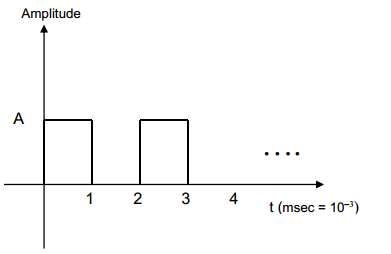I'm having a very hard time understanding frequency and harmonics and now that I'm working on problems, I am completely perplexed. The problem reads as follows -
Assume that string of bits 10101010... (Specific pattern) is the data that needs to be
send from computer X to computer Y in a LAN. The transmitted signal (signal leaving
computer X) for this data is represented in the figure below. Assume a periodic signal.
Identify the fundamental frequency of this signal, and the values for the first seventh
harmonics of this signal. Does this signal present all the harmonics? Only odd harmonics? Or
Only even harmonics?

From what I understand, I have figured out that each pulse has a period of 10ms and the duration of each pulse is 1/2f. Thus the data date is 2f bps.
Now using the the numbers I came up with above, 1/2f = .01 and solving for f, would mean the frequency is 50 Hz. This was the best I could come up with. Did I do this correctly? Also if I did, is the 50Hz the fundamental frequency?
